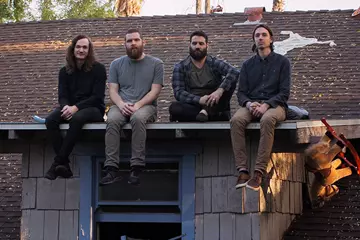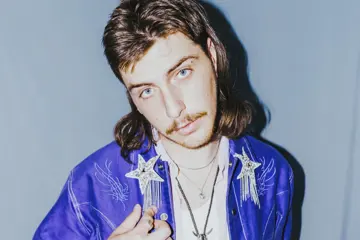 Rebecca Black
Rebecca BlackRebecca Black, queer icon and pop superstar, rose to fame at the tender age of 13 thanks to Friday, which cataclysmically changed her life, as she described during her BIGSOUND keynote.
Known as one of the first ever ‘viral’ moments of the internet, Black - who also performed a secret show in Brisbane on Wednesday night - was thrust into a new world, where she was relentlessly bullied, and her music video was turned into a meme before memes were really even a thing.
Since then, she has reclaimed her power, channelling it into making more music, this time with age and wisdom on her side. However, it’s clear that Friday will be a moment that defines her forever.
“I did a TV appearance here yesterday, and it’s funny to be introduced with a picture of your thirteen-year-old self,” she laughed.
“To be thirteen years old in itself is a wretched time, but it's also a moment in your life where you first begin to experiment with things that may or may not become a part of what you want to do for the rest of your life.
Don't miss a beat with our FREE daily newsletter
“Friday was just this unique opportunity for me to do this thing, and I wanted to do it because it sounds fucking awesome! To be able to record a music video and do it with my friends and even just to have it exist… I had no expectations because why would I?
“It wasn’t me being, ‘Here’s my big pop moment.’ It was just me wanting to have a really cool experience.”
Unfortunately, it wasn’t really the cool experience that she had hoped for, and her viral moment turned into something much more sinister. From receiving death threats to relentless bullying, Black grew up in an environment where she was extremely insecure.
“At the time, my biggest priority was like, ‘God, I do not want to be a loser,’ because being a thirteen-year-old in middle school, the worst thing you could feel like you could be is someone who is not liked or isolated.
“That feeling stays just as bad throughout your life. I just wanted to feel like I had a chance to feel accepted as a person. I didn’t really care about being accepted as an artist until I grew up to be 18-19. There was definitely a lot of shame that I put on myself as a kid in that time because when you’re that young, there is no sense of self to really bounce off.”
Despite the intensity of what she experienced, she never shied away from going headfirst back into the industry with a want to prove herself as something different, despite the stigma attached to her name.
“A lot of people mentioned that it would probably be easier to start fresh with a name nobody has heard of, but I would love to tackle that challenge,” she said.
“I put a lot of shame on myself and my name. It felt like my name had like a taste to it that would always be something that I had to deal with, but at the same time, why not just keep going and see what happens and show that the same person that did that can evolve, and make something new.”
Her new music definitely emulates that, bursting with hyper-pop goodness that places her artistry so far away from the complicated Friday experience. Now, much surer of herself and her musical direction, she’s blossomed into a true pop icon that has changed lives with her diverse story and resilience.
“I wanna make songs that people rage to, in whatever way that is. I want to prove to people that I work just as hard as any other artists in this realm, and I want to be treated as such. Or at least have someone listen to the song the same as they would any artist, and it's not just, ‘The Friday girl makes music now that’s less bad.’”
Before ending her keynote, she was asked about the new album, but it was clear Black wanted to hold her cards close to her chest, only mentioning, “I don’t think people will expect it.”















